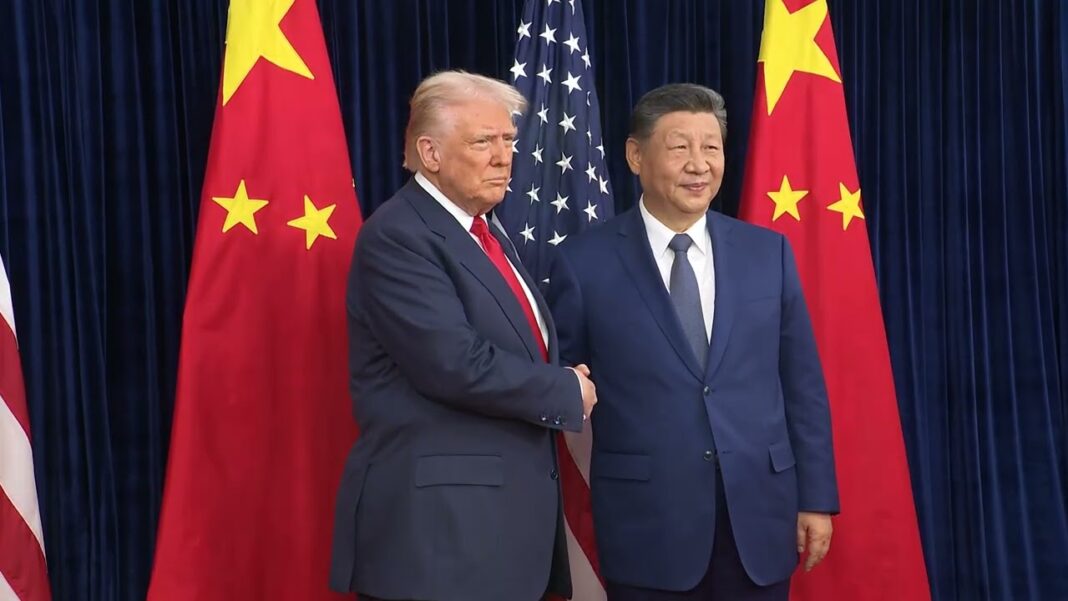Traditionally a top importer of American soybeans, China had not made any purchases from the United States this harvest season.
President Donald Trump and Chinese leader Xi Jinping met on Oct. 30 in the South Korean city of Busan.
The meeting, which took place on the sidelines of the Asia-Pacific Economic Cooperation (APEC) summit, lasted about 100 minutes, according to Chinese state media.
“We agreed on many things, with others, even of high importance, being very close to resolved,” Trump said in a social media post after the talks with Xi.
“I had a truly great meeting with President Xi of China.”
Trump has returned to Washington after a week-long trip to Asia, which also included stops in Malaysia and Japan.
Xi, meanwhile, will continue his state visit to South Korea—the first in 11 years—and attend the APEC summit in Gyeongju.
Here are nine takeaways:
China to Buy US Soybeans
China could begin purchasing “tremendous amounts of the soybeans” and other farm products “immediately,” Trump told reporters after the meeting with Xi.
Traditionally a top importer of American soybeans, China had not made any purchases from the United States this harvest season, instead turning to Brazil and Argentina to fulfill its quota. Trump has accused the communist regime of seeking to use American farmers as leverage, saying he would use the money the federal government brought in from tariffs to cushion farmers’ losses.
Ahead of the Trump-Xi talks, Treasury Secretary Scott Bessent said on Oct. 26 that he anticipated Beijing would restart substantial purchases of U.S. soybeans, following two days of negotiations with Chinese trade officials in Malaysia.
Agriculture Secretary Brooke Rollins announced in a social media post on Oct. 29 that China had booked multiple shipments of American soybeans.
“This purchase, coming directly ahead of the Trump-Xi talks, shows that America means business and that we will restore balance, give U.S. producers the opportunities they’ve earned, and send a message that when America leads in agriculture, the world listens,” Rollins said on X.
Today’s purchase by China of multiple ships of American soybeans signals @POTUS’ strong dealmaking and a positive step forward for our farmers.
— Secretary Brooke Rollins (@SecRollins) October 29, 2025
This purchase, coming directly ahead of the Trump-Xi talks, shows that America means business and that we will restore balance, give…
Rare Earth to Flow
Issues surrounding China’s supply of rare earths—essential for manufacturing a wide range of products from electric vehicles to military jets and submarines—were addressed during the meeting, according to Trump.
“All of the rare earth has been settled, and that’s for the world,” Trump told reporters aboard Air Force One shortly after the talks with Xi.
Trump said that Beijing had agreed to a one-year pause on its plan to impose stringent export controls on rare earth. He mentioned the agreement could be extended after a year.
“There’s no roadblock at all on rare earth. That will hopefully disappear from our vocabulary for a little while,” he added.
In a later statement, China’s Commerce Ministry confirmed the decision to postpone, for one year, the implementation of rare-earth export curbs and other related measures announced on Oct. 9. A ministry spokesperson said that Beijing will study and refine specific implementation plans.
In exchange, the United States will delay for one year the enforcement of a new export control regulation unveiled on Sept. 29 that would automatically blacklist subsidiaries of companies that are at least 50 percent owned by a company on the Entity List.
The Epoch Times has reached out to the White House for comment.
Port Fees Pause
Aside from export control measures, Beijing and Washington will suspend port fees for one year, according to the statement from China’s Ministry of Commerce.
The United States began charging port fees on China-built vessels starting from Oct. 14, based on a Section 301 investigation by the Office of the United States Trade Representative (USTR), which found that the regime’s trade polices and practices were “unreasonable” and severely damaging to U.S. companies, workers, and the economy.
In a same-day retaliation, the communist regime began charging U.S. ships docking at Chinese ports.
According to the Chinese Commerce Ministry, Beijing will now suspend its countermeasures for a year, while the United States pauses related actions stemming from the Section 301 probes into China’s maritime, logistics, and shipbuilding sectors.
U.S. Trade Representative Jamieson Greer, speaking to reporters on Air Force One, also mentioned this decision.
“We’re going to postpone that while we negotiate with them about that issue,” Greer said.
He also noted that South Korea, the world’s leading shipbuilder, has committed to investing $150 billion in the U.S. shipbuilding industry.
“We think we have a good path forward,” Greer added.
US to Halve Fentanyl Tariffs
The Trump administration will cut the 20 percent fentanyl-related tariffs to 10 percent, effective immediately. The adjustment brings the total levies on Chinese goods to 47 percent.
The president expressed confidence that Beijing would take “strong action” to stop the flow of precursor chemicals used in fentanyl production.
“I believe he’s [Xi] gonna work very hard to stop the death that’s coming in,” Trump told reporters while departing South Korea.
In return, China will “correspondingly adjust its countermeasures” against the United States, the regime’s commerce ministry said in a statement.
The United States has determined that China is the main supplier of the deadly illicit drug in the United States, and Trump, in an executive order on Feb. 1, imposed initial tariffs on China for its “central role” in the fentanyl crisis.
In the order, Trump stated that Beijing subsidizes chemical companies that produce fentanyl precursors, supports the drug trafficking network through money laundering schemes and other means, and could have shut down these operations if it wished.
Trump to Visit China Next April
Trump confirmed a visit to China in April next year.
Xi will visit the United States “sometime after that,” Trump said, saying that the Chinese leader could be visiting either Palm Beach in Florida or Washington.
Trump visited China during his first term in office in November 2017. Following the trip, companies from the two countries signed trade and investment deals worth over $250 billion, although some had been in the works prior to the visit and many were non-binding.
The scheduled trip will raise a key question: whether Secretary of State Marco Rubio, who was twice sanctioned by Beijing in 2020 for his vocal criticism of China’s human rights record, will be able to accompany Trump, given that the sanctions bar him from traveling to China.
Before Trump’s scheduled trip to China, the Chinese regime’s rubber-stamp legislature, the National People’s Congress, is slated to hold a meeting in March 2026 to review and finalize its 15th Five-Year Plan for economic and social development.
Taiwan
The issue of Taiwan, which Trump had said he would raise, did not come up during his meeting with Xi.
“It never came up. Taiwan never came up. It was not discussed, actually,” Trump said.
Xi has instructed his military to prepare for a 2027 attack on Taiwan. In August, Trump said that Xi had assured him that China would refrain from invading Taiwan during Trump’s presidency.
Before the Trump-Xi meeting, Taiwanese Foreign Minister Lin Chia-lung said on Oct. 30 that Taiwan is “confident” in its relations with the United States and that the two sides have “close communication channels,” dismissing speculation that Taiwan’s interests might be compromised by discussions between the two world leaders.
Taipei and Washington are not formal diplomatic allies, but the United States has been the island’s largest arms supplier for its self-defense.
TikTok Deal
Trump did not mention TikTok after he met with Xi. However, after the meeting, China’s Commerce Ministry announced that it will “properly resolve issues” related to TikTok, without providing details.
On Sept. 25, Trump signed an executive order setting the path for a TikTok deal that could shift majority ownership of the app to American investors. Under the order, ByteDance has 120 days to finalize the transaction terms.
Under the deal, ByteDance would hold one of seven board seats and less than 20 percent of stock in TikTok’s U.S. business.
Oracle, which will host TikTok’s U.S. user data on its servers, has been named TikTok U.S.’s security provider. The company will oversee the platform’s code and updates, monitor the content recommendation algorithm, and watch for any signs of malicious influence.
‘American Energy’
In a post on Truth Social after meeting Xi, Trump announced a potential “American energy” deal with China, saying that Secretary of Energy Chris Wright and Secretary of the Interior Doug Burgum are working to complete an agreement that would see China make a “very large-scale transaction” of oil and gas from Alaska.
China has largely shunned U.S. crude oil imports and has instead been reselling American liquefied natural gas (LNG) since early this year, as Beijing’s high tariffs have made purchases unviable.
China, the world’s largest importer of LNG, purchased about 5 percent of LNG and 2 percent of crude oil from the United States in 2024, according to Chinese customs data.
The Semiconductor Question
Trump and Xi discussed semiconductors and chips during their meeting, but they didn’t discuss approving the sale of Nvidia’s advanced Blackwell artificial intelligence chips.
“They’re [China] going to be talking to Nvidia and others about taking chips,” Trump said, but the United States will be acting as a “sort of arbitrator or the referee.”
Asked by a reporter whether his administration would authorize exports of Blackwell chips, Trump replied, “We’re not talking about the Blackwell.”
Trump said he will be speaking with Nvidia CEO Jensen Huang, who has been in South Korea participating in the APEC summit and meeting with global leaders and top Korean executives.
Catherine Yang contributed to this report.
By Dorothy Li and Frank Fang







